

BBC Learning English - Course: English In A Minute / Unit 2 / Session 27 / Activity 1.
How to use real conditionals - English In A Minute. Using Mixed conditionals - BBC English Class. Three Tims argue about a common 'mistake' with conditionals - Stop Saying! SECOND/UNREAL CONDITIONAL. Zero (Real) conditional. First Conditional. A review of conditionals: BBC English Class. If You Learn Conditionals, You'll Be Glad You Did! In this week's episode of Everyday Grammar, we are going to talk about conditionals.

We use conditionals to show that something is true only when something else is true. Conditionals offer endless possibilities for creative and imaginative expression. Present real conditional The present real conditional is the most basic kind of conditional. Basically, when A happens, B happens. Everyday Grammar: Introducing Conditionals. In this week's episode of Everyday Grammar, we are going to talk about conditionals.
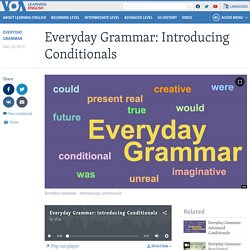
We use conditionals to show that something is true only when something else is true. Conditionals offer endless possibilities for creative and imaginative expression. Everyday Grammar: Advanced Conditionals. This week, we are going to talk about the past unreal conditional.
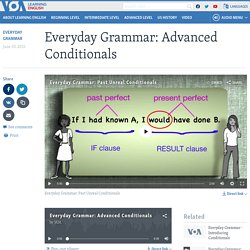
Past unreal conditionals are often used to express wishes about the past. They often show regret, or sad feelings about something that happened in the past. Here's an example: If I had studied, I would have passed the test. In this example, there is an implied wish that the speaker had studied. Grammar Girl #720. Tricky Conditionals. In Your Wheelhouse. Conditional Sentences—Rules You Need to Know. There are four types of conditional sentences.It’s important to use the correct structure for each of these different conditional sentences because they express varying meanings.Pay attention to verb tense when using different conditional modes.Use a comma after the if-clause when the if-clause precedes the main clause.
Conditional sentences are statements discussing known factors or hypothetical situations and their consequences. Complete conditional sentences contain a conditional clause (often referred to as the if-clause) and the consequence. Consider the following sentences: If a certain condition is true, then a particular result happens. I would travel around the world if I won the lottery. When water reaches 100 degrees, it boils. Your writing, at its best. Be the best writer in the office. Get Grammarly. Zero conditional. Conditional sentence. BBC Learning English - Course: English In A Minute / Unit 1 / Session 62 / Activity 1. BBC Learning English - Course: intermediate / Unit 24 / Session 2 / Activity 3. Mixed conditional? Hi, Freeguy, I think "You shouldn't be so tired" is not modern usage; "Would" is what's meant.
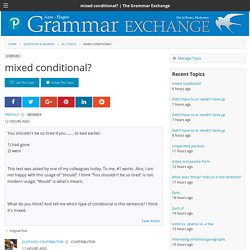
I see your point, but "should" can also be used to express deduction or probability. I'll give you my point of view: You shouldn't be so tired if you went to bed earlier.You shouldn't be so tired if you had gone to bed earlier.You wouldn't be so tired if you went to bed earlier.You wouldn't be so tired if you had gone to bed earlier. If "should" is used as the first person form of "would," then (1) is, just like (3), a type 2 conditional, which might sound like a piece of advice: Go to bed earlier and you won't feel so tired next time.
If "should" is a modal indicating probability, then I interpret "went" as a real past in (1), meaning: 1': If it is true that you went to bed earlier (than usual), then you shouldn't be so tired now (= there's no accounting for your current tiredness). Learning English. Everyday Grammar: Conditionals (Without "If") English Grammar Today on Cambridge Dictionary - Conditionals & wishes. Conditionals (Advanced) BBC Learning English - Course: Upper-intermediate / Unit 18 / Session 1 / Activity 1. Everyday Grammar: Introducing Conditionals.
BBC Learning English - Course: Upper-intermediate / Unit 28 / Session 1 / Activity 1. Aprendiendo Gramática Inglesa. Third conditional. First or second conditional? First, Second, and Third Conditional. Conditional Sentences—Rules You Need to Know. B1 Grammar: Second Conditional. B1 Grammar: Third Conditional. A2 Grammar: First Conditional. A2 Grammar: Zero Conditional. B2 Grammar: Mixed Conditionals. Conditional Forms in English Quiz. Conditional Forms and Sentences in English. Conditional forms are used to imagine events in certain conditions.
English language quiz - conditionals - 01. If we leave now, we'll get there on time.

This refers to an unreal situation. This refers to a real situation. This refers to something that is generally true.If you book your tickets in advance, you get a better price. This refers to the future. This refers to something that is generally true. English language quiz - conditionals - 02. If he'd fallen from the 30th floor, he could have died. he might have died. he would have died.If I'd studied harder at school, I would have a better job now I might have a better job nowI'd be absolutely starving now if I didn't eat since yesterday. if I hadn't eaten since yesterday.If she'd known about the party she would come. she would have come.If she got your message, she'll definitely be here later. she'd definitely be here later. she'd have been here later.If I hadn't come here today, I wouldn't be learning about conditionals now.
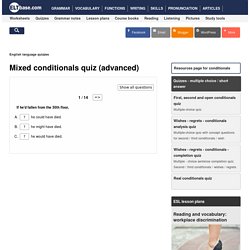
I wouldn't learn about conditionals.If you had been in her position, what would you have done? What did you do? What would you do? Conditionals exercises. English Conditionals exercise. GMAT Sentence Correction: Conditional Statements - Kaplan Test Prep. Conditional exercises. If Sentences for ESL Learners. English learners should learn if sentences, also known as conditional forms, in order to discuss various possibilities that are either realistic or imaginary.

Follow the introduction below, you will find a grammar overview and explanation for each tense. Once you are familiar with these forms, use the referenced materials to practice and further your understanding of these forms. Teachers can print out the comprehension materials related to the materials, as well as the suggested lesson plans with point-by-point instructions on how to teach the conditional forms in class. The Basics: What Are If Sentences? If sentences are used to discuss things that happen based on the condition that something else happens. Learning English. BBC World Service. Conditionals: other expressions ( unless, should, as long as ) Conditional clauses can begin with unless.
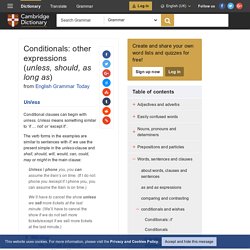
Unless means something similar to ‘if … not’ or ‘except if’. The verb forms in the examples are similar to sentences with if: we use the present simple in the unless-clause and shall, should, will, would, can, could, may or might in the main clause: Unless I phone you, you can assume the train’s on time. (If I do not phone you /except if I phone you, you can assume the train is on time.) We’ll have to cancel the show unless we sell more tickets at the last minute.
Learning English. BBC Blogs - Internet Blog - Labelling BBC Online's archived websites. Learning English. ENGLISH PAGE - Conditional Tutorial. There are two kinds of conditional sentences: real and unreal. Real Conditional describes real-life situations. Unreal Conditional describes unreal, imaginary situations. Although the various conditional forms might seem quite abstract at first, they are actually some of the most useful structures in English and are commonly included in daily conversations. If you prefer to use the conditional pages as a reference only and do not want to complete the tutorial, Click Here. How to use this tutorial: 1. 2. 3. Conditionals. Conditionals. Comparative and superlative adjectives - 03. Conditionals. Shopping in Great Britain. Things that get on your nerves: wish. Wish and if only. Conditionals - 01. BBC Learning English - Course: Upper-intermediate / Unit 28 / Session 1 / Activity 1. English Grammar - Using Conditionals (If-Sentences)
Conditionals: typical errors. We don’t use will and would in the conditional clause: If you book before April 30th, you will receive a 20% discount.
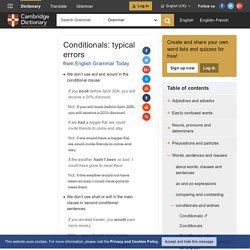
Not: If you will book before April 30th, you will receive a 20% discount. If we had a bigger flat, we could invite friends to come and stay. Not: If we would have a bigger flat, we could invite friends to come and stay. If the weather hadn’t been so bad, I could have gone to meet them. Not: If the weather would not have been so bad, I could have gone to meet them. We don’t use shall or will in the main clause in second conditional sentences: If you worked harder, you would earn more money. Not: … you will earn more money. Getting Your Tricky Conditionals Right. I’ve had several questions recently about conditionals.

Some of them are from listeners asking about kinds of conditionals called the “first, second, and third conditionals.” Meanwhile, a listener named Lorelai has a different question. BBC Learning English - Course: intermediate / Unit 24 / Session 2 / Activity 1. BBC Learning English - Course: Towards Advanced / Unit 7 / Grammar Reference. Conditionals: if. There are different types of conditions. Some are possible or likely, others are unlikely, and others are impossible: If the weather improves, we’ll go for a walk.
(It is possible or likely that the weather will improve.) If the weather improved, we could go for a walk. (It is not likely that the weather will improve.) If the weather had improved, we could have gone for a walk. These types of conditions are used in three types of sentences, called first, second and third conditional sentences. We use the first conditional to talk about the result of an imagined future situation, when we believe the imagined situation is quite likely: [imagined future situation]If the taxi doesn’t come soon, [future result]I’ll drive you myself. How to Use 'Would' - Modal Verbs Video Lesson. English grammar - Conditionals - ESL activities. How Donald Trump got rich: a tale of three Trumps US Election Special 2016 Wear high heels or go home: gender discrimination at work Comparison with as...as Comprehensive grammar reference notes, illustrated.
English language quiz - conditionals - 01. BBC Learning English - Course: Upper-intermediate / Unit 8 / Session 1 / Activity 1. BBC Learning English - Course: Towards Advanced / Unit 7 / Session 1 / Activity 1. Conditional Sentences (Advanced) Conditional Sentences. Third conditional. We use the third conditional (if + past perfect, would + have + past participle) to talk about something in the past that did not happen. How is the third conditional different from the other conditionals? This is the way we imagine how things could have been different in the past. If something had been different, something else would have happened. Notice that both the condition and the result are impossible now.
If I’d known, I would have worn something nicer. In this case, Amy didn’t know about the party so she didn’t wear special clothes. OK, so the bit after if is different to what really happened? Yes, then the next clause is imagining the result in the past, which didn’t happen, of course. Conditionals - English Grammar Today - Cambridge Dictionary. Conditional sentences consider imagined or uncertain situations and the possible results of these situations. Conditionals: other expressions ( unless, should, as long as ) - English Grammar Today - Cambridge Dictionary. Conditional clauses can begin with unless. Weird Conditionals: If-Clauses That Are Always True. Page 1 of 3 Today’s topic is the funny case of a special kind of if-clause, which is also a conditional mood construction.
Getting Your Tricky Conditionals Right.